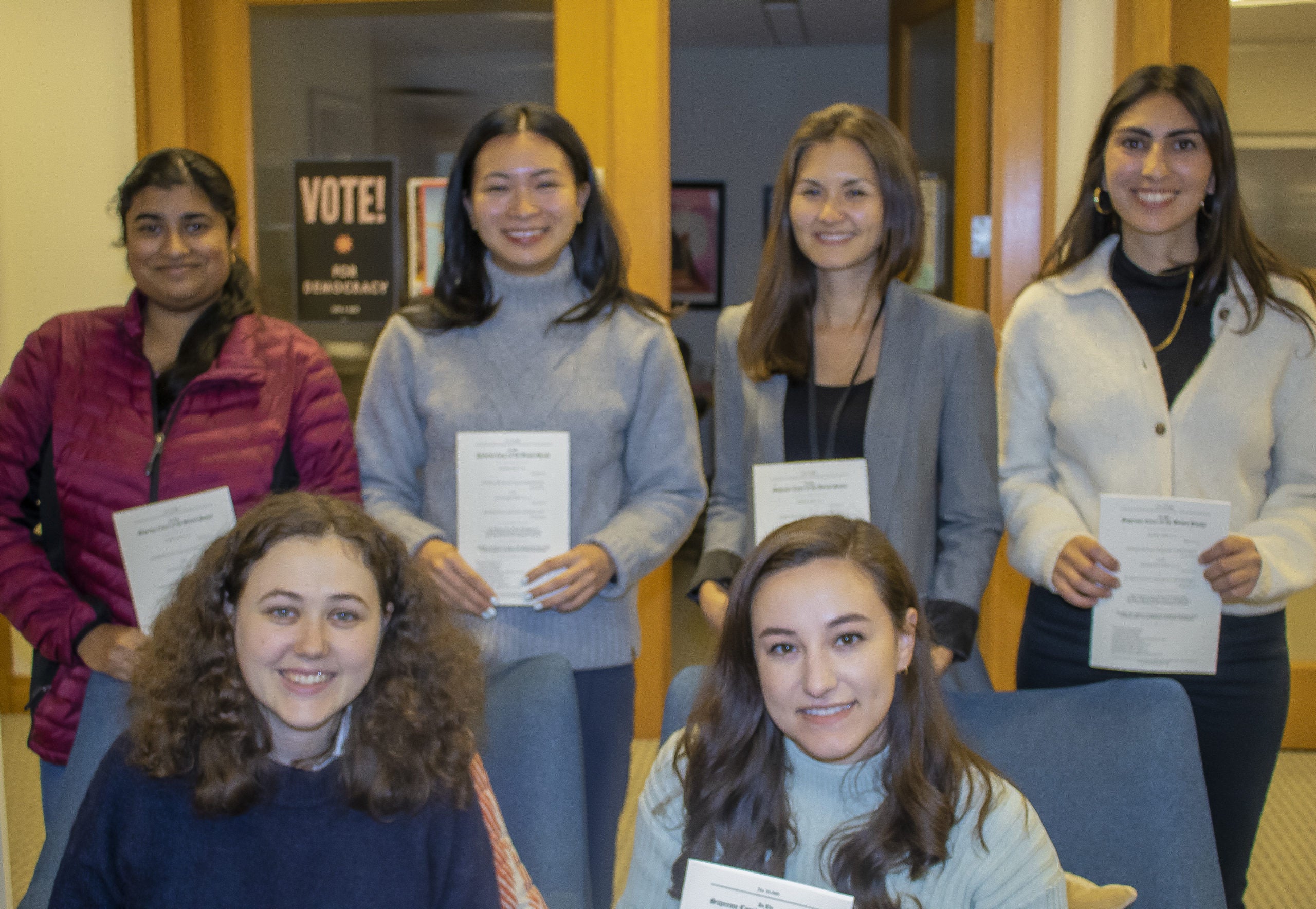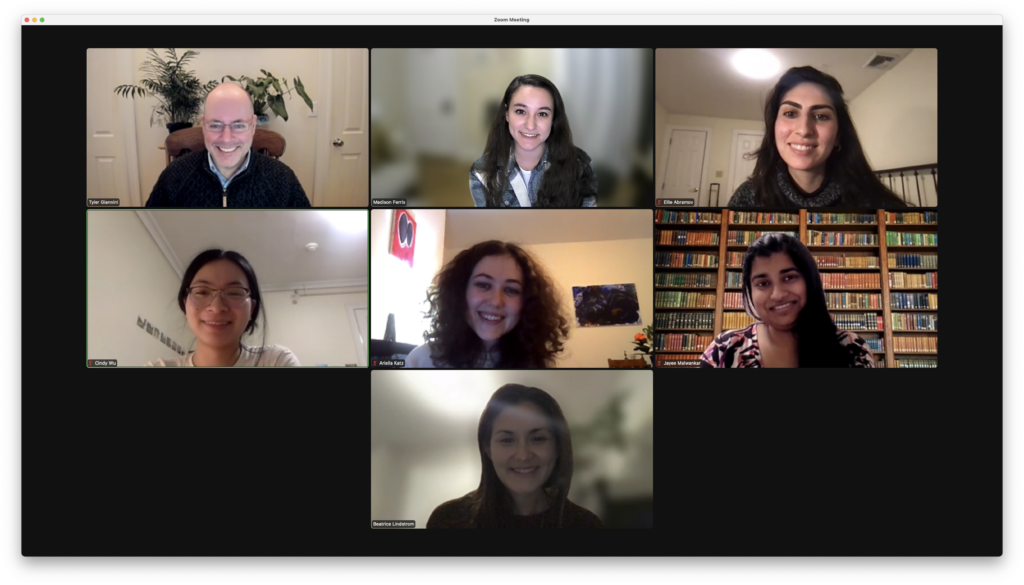By Olivia Klein

After weeks packed full of hours-long Zoom calls, consulting with legal experts, and ceaseless revisions, on February 14 a team of students working with the International Human Rights Clinic submitted an amicus brief on behalf of international scholars to the Supreme Court in Jam v. International Finance Corporation (IFC).
The case has been in motion since 2015, when the plaintiffs, a group of farmers and fishworkers in India who have suffered devastating impacts from the Tata Mundra Power Plant, filed their complaint. The coal-fired power plant project was financed by the IFC, the branch of the World Bank Group that lends to private corporations. Since the power plant’s construction, local fisheries, water supplies, and community residents have borne the brunt of the plant’s pollution practices, and its lack of ability to turn a profit has had economic ripples into the surrounding communities.
On January 10, 2022, EarthRights International, who represent the plaintiffs, filed a writ of certiorari to ask the Supreme Court to review the case’s most recent holding by the D.C. Circuit court. Given the implications for accountability of international organizations as well as the doctrine of sovereign immunity more generally, the International Human Rights Clinic team took the opportunity to contribute an amicus brief on behalf of international legal experts that questioned the underpinnings of the lower court’s ruling. The team had two supervisors: the five students were led by clinical instructor Beatrice Lindstrom and worked closely with clinic director Tyler Giannini. Much of Lindstrom’s legal work has focused on the immunities of international organizations, a core issue at stake in the case, and Giannini has long run litigation teams through the clinic that have filed amicus briefs on behalf of scholars with the Supreme Court. The timing of the filing presented a challenge, as the bulk of the work needed to happen within the narrow window of the winter term.
Madison Ferris, JD ’23, was working with Lindstrom this fall on the International Human Rights Clinic’s Aid Accountability Project when the Jam appeal came along. While juggling her existing work in the fall, Ferris wrote an initial outline for the brief and shared it with her fellow students, who were excited to hop on board for the winter term. During January, students worked around the clock to craft the brief with the amici.
“Going into it, timing was a big pressure,” Ferris said. “We knew we needed to be prepared to hit the ground running once we got into the January term. We did extra research before the term started to make sure we were coming in as fully prepared as we could be. For an amicus brief, it’s not only a race to finish drafting. You also need to involve the amici, so it bumps up the process even more. You can’t be drafting right up to the deadline. It required a lot of pre-planning for the rush of litigation with all hands on deck. It was a special opportunity, and the January term format allows you to really dig in during that period.”
Each of the students involved in the brief had been a member of the International Human Rights Clinic during the fall term, bringing valuable working knowledge to the drafting process during the winter. Still, each student found that this amicus brief brought an opportunity to explore a new topic and gain new skills. Jayee Malwankar, JD ‘23, was thrilled to apply her clinical skills to a case that has international implications. “Going into the winter, I wanted to continue because I was excited by the Jam case, both academically and thematically,” she said. “Academically, I really wanted to get the chance to write a brief and work on my brief writing skills. Thematically, I was really interested in the issue of sovereign immunity. I had a sense of the Jam case because I had heard about it when it first went up to the Supreme Court.”

The drafting process was collaborative from the start. “I have vivid memories of four hour Zoom calls with all of us and our supervisors,” said Cindy Wu, JD ‘22. “Someone would share their screen and we would look at the brief line by line and point out errors or things we wanted to change.” Lindstrom and Giannini offered support from start to finish of the drafting process. “With two clinical supervisors and five students working on the project, we got so much individual feedback and attention. It was a great learning opportunity in terms of legal research and writing, and legal advocacy and argumentation,” Ferris said.
In July 2021, the D.C. Circuit held that the IFC was immune from suit for its commercial activities because those activities were not the most direct cause of the plaintiffs’ injuries. The clinic’s brief draws on international law and legislative history to argue that the Foreign Sovereign Immunities Act was enacted to ensure that sovereigns should be treated the same as private parties when sovereigns engage in commercial activity, regardless of whether that conduct is the sole or most direct cause of injury. “If the D.C. Circuit’s holding is allowed to stand, it could have sweeping implications for whether communities are able to sue for harms caused by states and international organizations,” said Lindstrom.
Working through complex international legal arguments with international scholars required comprehensive editing throughout the drafting process. “I think I’ve never edited a piece of writing as much,” added Ariella Katz, JD ’23. “We put together a first draft, and then we completely took it apart and put it back together. It was a collective effort to be constantly rethinking the big idea behind the brief with input from the amici. I loved that Tyler and Bea let us all have a voice in shaping the vision for the brief. There was a real sense of ownership over what we came up with, because we worked together through this exhaustive and substantive editing process.”
“My favorite part of working on the Jam case was working with a team of people who are so passionate and brilliant. I had never written a piece with so many minds working on it, and the sense of camaraderie that you get when you’re very focused on one thing and collaborating on it and strategizing was really amazing,” said Katz. Wu was also drawn to the project with the hopes of learning from her colleagues. “I got to work on ongoing litigation with Tyler in the fall, which made me excited about doing human rights litigation in the domestic context, which drew me to the Jam project,” Wu said. “I wanted to work with a team of students who are very smart and learn from them and our supervising attorneys.”
The engagement with the international scholars was also invaluable for the student team. “One thing that was surprising and exciting was having the chance to work with so many different scholars,” Malwankar said. “The brief really evolved from the start to the finish because we were taking in the input of people who had scholarly suggestions and experience in the field.”
Now that the brief has been submitted, the team has breathed a sigh of relief. “I celebrated by sending the brief to family and friends,” said Wu. “All I got back were question marks, like ‘What does sovereign immunity mean?’ They tried to engage with it, but I think ultimately, we’ll just leave it to the Supreme Court clerks and justices,” she laughs.

After working together remotely throughout the term, Malwankar was looking forward to holding a physical copy of the brief with her teammates. “I was so excited to get a copy of the brief. We all discussed how surreal it feels to see it professionally formatted and printed in the Supreme Court amicus brief style. To even learn a bit about what it takes to file a brief in the Supreme Court and what the printing process looks like was really interesting.”
Ellie Abramov, LLM ‘22, plans to pursue human rights litigation after graduation, and she reflects on the impact this project has had on her hopes for her career. “The subject matter has really solidified that this is the area I want to work in. I feel extremely passionate about holding institutions or bodies that normally escape liability accountable for their human rights violations. This project also showed me how to create a great working environment. We all had a really good experience working together collaboratively and creating something together, and that’s something that I want to take into every aspect of my work.”
Now that the IFC has filed their response, the Supreme Court will decide whether they want to take up the case. “For the plaintiffs in this case, it’s been a very long road to get here, and we’re still at early stages of litigation,” says Ferris. “We’re all hoping that it gets past this stage as one more step towards the road of getting them the resolution and justice that they seek.” Katz noted the potential implications of the case for future plaintiffs. “I hope that the IFC gets the message from this litigation that they’ll be held accountable for the harmful investments that they make,” she says.
“Hopefully the kinds of tragedies that have happened with the Tata Mundra Power Plant won’t happen again in future investments,” Katz added. “It’s sending a message that business and human rights are intertwined. Big international organizations can’t wash their hands of the deeds that they do.”
Filed in: Clinical Student Voices, In the News
Tags: Beatrice Lindstrom, Class of 2022, Class of 2023, International Human Rights Clinic, Tyler Giannini
Contact Office of Clinical and Pro Bono Programs
Website:
hls.harvard.edu/clinics
Email:
clinical@law.harvard.edu